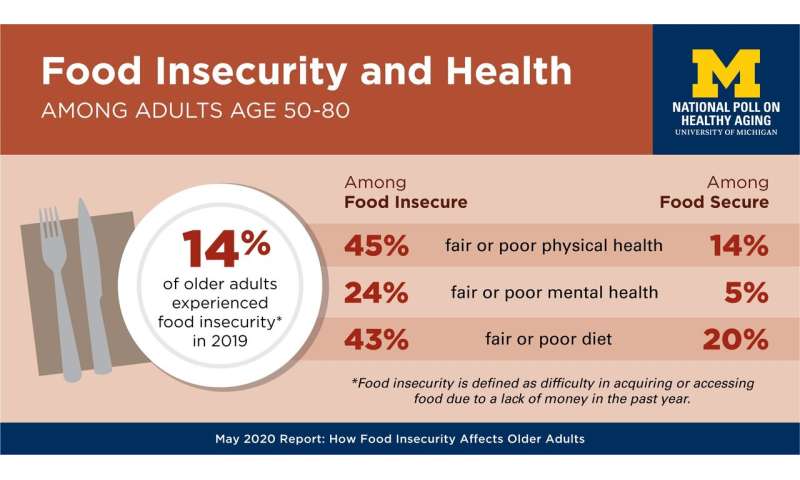
Even before the coronavirus pandemic wreaked havoc with the nation’s food supply and economy, one in seven adults between the ages of 50 and 80 already had trouble getting enough food because of cost or other issues, a new poll finds.
The percentage who said they’d experienced food insecurity in the past year was even higher among those in their pre-Medicare years, and those who are African-American or Latino. Older adults with lower household incomes and lower levels of education were also more likely to say they had had trouble getting food.
Yet only a third of those with food affordability issues were receiving government food aid for people with low incomes, called SNAP benefits or “food stamps.” And less than 2% of those over 60 have received free meals served at senior centers or delivered to their home by programs like Meals on Wheels.
Disruptions to food supply chains, employment and social services from COVID-19 may have worsened disparities, say the experts who designed the poll.
The new results come from the National Poll on Healthy Aging, carried out by the University of Michigan Institute for Healthcare Policy and Innovation with support from AARP and Michigan Medicine, U-M’s academic medical center. It involved a national sample of more than 2,000 adults aged 50 to 80 who answered a range of questions about their food security in December 2019.
“These data suggest an important opportunity, which is likely even more urgent now, to connect older adults with resources they may not know about, and to explore public policies that could improve access,” says Cindy Leung, Sc.D., M.P.H., a member of IHPI and assistant professor of nutritional sciences at the U-M School of Public Health who worked on the poll.
Julia Wolfson, Ph.D., M.P.P., an assistant professor of health management and policy at the School of Public Health, notes the striking differences the poll reveals between those who said they hadn’t experienced food insecurity in the past year, and those who had. “Food-insecure older adults were three times more likely to say they were in fair or poor physical health, and nearly five times as likely to say they were in fair or poor mental health,” she says.
Older adults with recent experiences of food insecurity were also twice as likely to say their diet was fair or poor. This could have further implications for their long-term health.
“Access to nutritious food and health status are closely linked, yet this poll reveals major disparities in that access,” says Preeti Malani, M.D., the poll’s director and a professor of internal medicine at Michigan Medicine. “Even as we focus on preventing the spread of coronavirus, we must also ensure that older adults can get food that aligns with any health conditions they have, so we don’t exacerbate diabetes, hypertension, digestive disorders and other conditions further.”
“This research reaffirms that many older adults struggle to afford the food they need, and are not using available food and nutrition assistance programs,” says Alison Bryant, Ph.D., senior vice president of research for AARP. “The current crisis makes it even more urgent to ensure that our most vulnerable populations can access the nutrition they need.”
Options for increasing food security after 50
Malani notes that because of COVID-19 and temporary closures of senior centers and other places that served meals, the federal program that supports Meals on Wheels and community food services for older adults has freed up money for more home delivery of meals. And new programs to feed older adults have started at the federal and state levels.
For instance, the state of Michigan has established an expanded program for meal delivery thanks to the newly flexible funds. An online form, available through the state COVID-19 website, acts as the central intake site.
Similarly, the U.S. Department of Agriculture, which oversees the Supplemental Nutrition Assistance Program or SNAP, has allowed states to apply for emergency waivers to make it easier for people to qualify for the program, or to stay on it.
AARP Foundation has provided grants to multiple programs that aim to reduce food insecurity, including Food on the Move, The Campus Kitchens Project and funding for states to help seniors apply for nutrition assistance. In light of the coronavirus crisis, AARP recently called for Congress and USDA to provide a temporary increase in the maxiumum benefit and minimum monthly benefit for SNAP.
Source: Read Full Article
